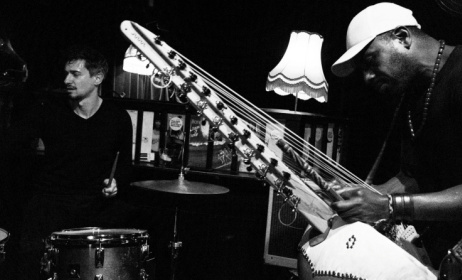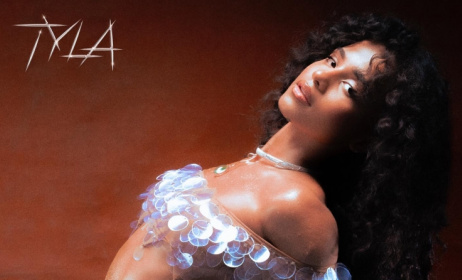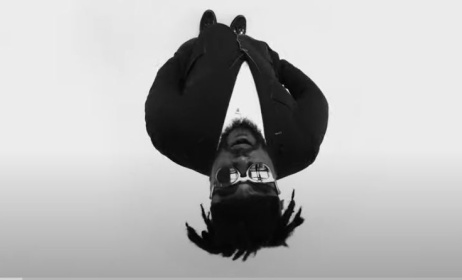Lindsey Abudei — And the Bass is Queen
 Lindsey Abudei has released a terrific first album
Lindsey Abudei has released a terrific first album Cover art for '...And the Bass is Queen
Cover art for '...And the Bass is Queen
Lindsey Abudei can sing. Lindsey Abudei can write a song. In the Nigerian music scene, those two qualities are too radical for a single artist. The album that confirms both statements is named …And the Bass is Queen. It is Ms Abudei’s debut album, and is possibly the very best album released by a Nigerian in 2016.
She’s been here before—Ms Abudei has been on songs by fellow Jos-raised artist Jesse Jagz, and back in 2013 she released an EP, Brown. Many missed it. Those familiar with the Abuja culture scene over the last half-decade were luckier: Ms Abudei was a fixture, occasionally jamming with Laolu Sebanjo, who is now known mostly for his work on Beyonce’s Lemonade. Staying away from Lagos means the singer-songwriter has had limited access to the centre of the Nigerian music industry. If you think of that as a mistake, you are both right and wrong.
Lagos gives prominence to the working artist but there’s no purity in the land. Lagos is the place where everyone and everything—including art, especially art—bows before commerce. In Lagos, the thought is never “How can we make this art better?” It is always: “How can we sell this?” If you think both questions are related, then you don’t belong in Lagos.
It may prove unpopular but I’ll make a declaration: there is no chance a Lagosian could have made an album as personal, precious, fragile and free as Bass is Queen. Lagos makes a Yemi Alade not a Lindsey Abudei. And Ms Abudei knows just how much her music comes from artistic liberty. “My freedom and I, we were born to live together,” she sings on ‘Freedom and I.’ The song starts off as a testament to individual freedom, and along the line becomes a tribute to nationhood:
The dream will not die We would learn to live together This land would abide And we would sing this song forever If it’s too wide. we’ll build a bridge across it If it’s too high, we’ll bring it downOn the lips of another artist, these words might come off as cheap and patronising, instead it is both personal and patriotic. This is because a large part of the success of this remarkable debut album is the nature of Ms Abudei’s vocals. She is every bit as convincing and unpretentious singing about her country as when she sings about a love interest. And, as the artist is a young woman, love naturally takes a fair portion of the album. On one of the weaker songs on the album, the words “I love you” are repeated with what sounds like increasing anguish, the kind that only love, that paroxysm of madness, can cause. Like most repetitive sections of songs, it teeters close to the unbearable—and yet you may find yourself wanting to be the object of such earnest love.
The album’s love songs are not all adulatory. “Apologize,” for example, is a love song coloured with contrition. In its remorseful words, it’s possible to see both a love interest and, if you are that kind of a listener, the Christian God:
I realise I am nothing without you Cos you are my king You are my all And I can do nothing without you I have been too foolish And I’ve been too proud I realise I am nothing without youThis association of godly and human love recalls an interpretation of the Songs of Solomon. According to Christian thought, the unabashed declarations of love (and lust) in that book of the Bible is between Christ and the church. It is however only a partial connection because Lindsey Abudei avoids erotic expressions. (In this way, she is different from both the Bible—and Banky W, who is the one Nigerian artist who has used religious imagery to suggest sex. Two examples: On last year’s ‘High Notes,’ he sang “She just went down on her knees and started blessing me” to describe a blow job. This year, he deploys a church choir to chorus the words “She has been with everybody else” in a line about sexual promiscuity in the video for ‘Gidi Love.’)
Unlike her contemporaries, Ms Abudei puts production and songwriting on equal footing. She enunciates clearly; she sings wonderfully; and the beat throughout the album is stellar but never intrusive. On occasion, as on ‘Home (Free)’ she coos to the beat, giving the listener yards and yards of sound to get lost in. It is a technique used by her pop music colleagues to perhaps allow the listener enjoy some dancing. On Bass is Queen the withdrawal of lyrics serves a different purpose: it sets up an atmosphere—a rare quality these days.
The album’s last two songs—‘Shoot Them Down’ and the aptly named ‘Leaving’—retain the atmospherics but switch the tempo to a delightfully groovy vibe. These pair of songs may not yield to the shoki dance but the songs seem designed for two persons, one of whom ideally would be both leggy and lithe.
Ms Abudei is clearly influenced by the west. Who isn’t? Her influences are in R&B from the nineties and early 2000s. (She paid tribute on Brown with an up-tempo song named ‘The 90s Song.’) These days when we celebrate what might be called indigenous sounds, it is easy to forget that we may also call it homogenous sounds. Radio hits are alike. With some variation, Reekado Banks is Wizkid is Wande Coal. That thread of Nigerian music has barely changed face in about a decade.
To an extent, that bit of Nigerian music was set in motion by Don Jazzy who brought in tricks learned from his time in the west. Thus, the contemporary sound does owe an uncertain debt to the west. What Lindsey Abudei does on Bass is Queen is take a different bit of the western sound and filter it through her own Nigerian experience. Other acts who have done similar channelling include Bez and Asa. Lindsey Abudei is perhaps the purest singer of the group. Her album is an act of courage, a quality easily dismissible as empty—it neither sells albums nor makes anyone dance—in the pop music scene. Not this time though, and that’s because …and the Bass is Queen is both original and pleasurable. It is one of the best albums released by a Nigerian in a decade.
Buy Lindsey Abudei's ...and the Bass is Queen on iTunes. Listen on Soundcloud.





























Comments
Log in or register to post comments